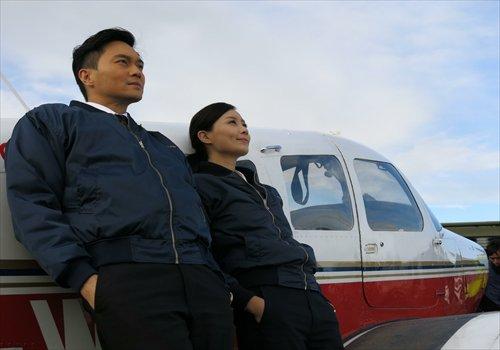 Enjoy your time in Maldives
Enjoy your time in Maldives
 Guangzhou rail service suspended, 80,000 affected
Guangzhou rail service suspended, 80,000 affected
 Pistorius to be indicted, trial in early 2014
Pistorius to be indicted, trial in early 2014
 Indian-controlled Kashmir celebrates Independence Day
Indian-controlled Kashmir celebrates Independence Day
 Reservoirs in S China start to release floods
Reservoirs in S China start to release floods
 Jimo Int'l Fashion Season kicks off in E. China
Jimo Int'l Fashion Season kicks off in E. China
 How do North Koreans stay cool in summer?
How do North Koreans stay cool in summer?
 China Beijing Int'l Gifts, Premium&Houseware Exhibition opens
China Beijing Int'l Gifts, Premium&Houseware Exhibition opens
 Amazing sunset scenery in Zhangjiajie, Hunan
Amazing sunset scenery in Zhangjiajie, Hunan
 |
| A still image from Triumph in the Skies II Photo: Courtesy of TVBI |
An efficient way to get a sense of an industry is by watching a TV drama. There are a lot of TV series focused on some certain industry or profession, called industry plays, that introduce the professional area of the industry and depict the life of those who have those jobs.
As a sequel to the previous successful airline industry play from 10 years ago, Triumph in the Skies II produced by Television Broadcasts Limited (TVB) has recorded high audience ratings in Hong Kong. Also, it has had 305 million views on youku.com and 40 million views on tudou.com as of Tuesday.
Airport professions
The TV series is centered around a group of aircraft commanders, stewardesses, training pilots and stewardesses, ground crew, aircraft maintenance staff and other staff at the airport. They witness and experience drama in their lives and bend themselves to be more professional.
The relationships among the main characters are complicated. Samuel Tong, the first Chinese captain according to the script, lost his wife and quit his job in the first several episodes. After a short period of recovery, he fell in love with a young girl, Holiday He, who had a crush on another excellent captain Jaydon Cool. The story also includes their different values on love and marriage, and some controversial elements such as surrogacy.
The episodes are filmed in cities around the world, including London, Paris, Sanya and Kenting. Because of all the dramatic romance among the characters, some viewers have called the show a mixture of romance and scenic film.
"The theme of the sequel is protection, so we added an aircraft maintenance engineer into the TV series," the executive producer of Triumph in the Skies II, Chan Wai Koon, told the Global Times in an e-mail. "We have been preparing for the sequel since the first drama for a long time, waiting for Francis Ng's (the actor for character Samuel Tong, the soul of the TV series) schedule."
Au Koon Ying, the executive producer of the TV series, said, "The most attractive part of Triumph in the Skies II is the cast and the exotic scenery. The story focuses on the airline industry in an international metropolis and we emphasize the relationship between different people, not only for romantic love, but also for family affection, friendship and the relationships among colleagues."
Industrial preparation
Since early 1990s, TVB has grown quite famous for creating TV shows that focus on certain professions, especially police, lawyers and doctors. Some netizens joke that TVB has filmed a TV series themed on most of the careers of Hong Kong's middle class.
The two executive producers of Triumph in the Skies II introduced in the e-mail, "10 years have passed, and our view of selecting themes has become more diverse, so we hope to describe the condition of the characters in a certain career more deeply.
"And we have different descriptions for various industries, so we still have a large area to improve ourselves. And as time goes on, many industries are changing, and there is always something fresh."
The executive producers said they started the preparation by collecting information and consulting with professionals to understand the general situation of that industry. Then the actors were trained to understand the characters about the professions, and the scriptwriter set the plots and designs the characters with appropriate professional backgrounds.
Still, the TV series is much more ideal than the real work.
Hu Ying, a fan of the previous Triumph in the Skies, became a stewardess after she watched the TV series 10 years ago. She told the Global Times that the new series is quite different from reality.
"Usually, we take four short-distance flights a day, so we have to arrive to work very early in the morning and leave very late at night. On the flight, we are very busy preparing food and drinks before takeoff. When we stay in other cities overnight, most of my colleagues choose to rest at the hotel because we are too anxious about work and we don't have so much time to play around."
Mainland dilemma
Compared with TVB series about professions, Chinese mainland TV programs face more challenges. For TVB scriptwriters, they sometimes can easily take inspiration from Japanese and American TV dramas. But even these references seem unavailable for Chinese mainland industry plays.
There have not been many excellent industry plays in the Chinese mainland in recent years for several reasons according to freelance critic Fang Liuxiang. One reason is the censorship and society background. The early pieces of Hai Yan (a mainland author and TV producer who produced a series of programs including Jade Goddess of Mercy) were actually police dramas that were quite popular in the late 1990s and early 2000s. However, in 2004 the then State Administration of Radio Film and Television banned all prime time programs that contained violent elements. Since that time TV series about criminal cases have been hard to pass the censorship process.
Another major difference in the mainland is that some professions operate in different ways due to the social environment. For example, lawyers could play a key role in Hong Kong and other places that apply a common law system, but in the mainland, which operates under a civil law system, the stories could not work in such a dramatic way. That is why it is harder for the mainland to produce excellent lawyer shows.
Then there is different focus of the audience. Fang said the main audience of TV programs in the mainland are housewives and students, who do not enjoy shows that contain too much professional knowledge. That kind of detail attracts well-educated audiences more. Based on statistics provided on youku.com, Triumph in the Skies II has a slightly higher percentage of male viewers and a much higher percentage of viewers with higher academic degrees than other TV series, such as Flowers in Fog.
And when a doctor drama is produced in the mainland, the audiences would rather see more conflict between doctors and patients instead of how the doctors heal patients' illnesses. That is what the audience want. But according to some principles, our TV dramas are required to build a positive image of the career, which means it would be hard to expose the dark side of the industry, according to Fang.
 PLA's integrated battle group in live-fire drill
PLA's integrated battle group in live-fire drill Egypt's clashes kill 525 so far
Egypt's clashes kill 525 so far Phubbers turn social etiquette on its head
Phubbers turn social etiquette on its head Jaguar Land Rover to recall 11,852 cars
Jaguar Land Rover to recall 11,852 cars Men's triple jump at IAAF World Athletics Championships
Men's triple jump at IAAF World Athletics Championships Christy Chung on 'COSMO' with lovely daughters
Christy Chung on 'COSMO' with lovely daughtersDay|Week|Month